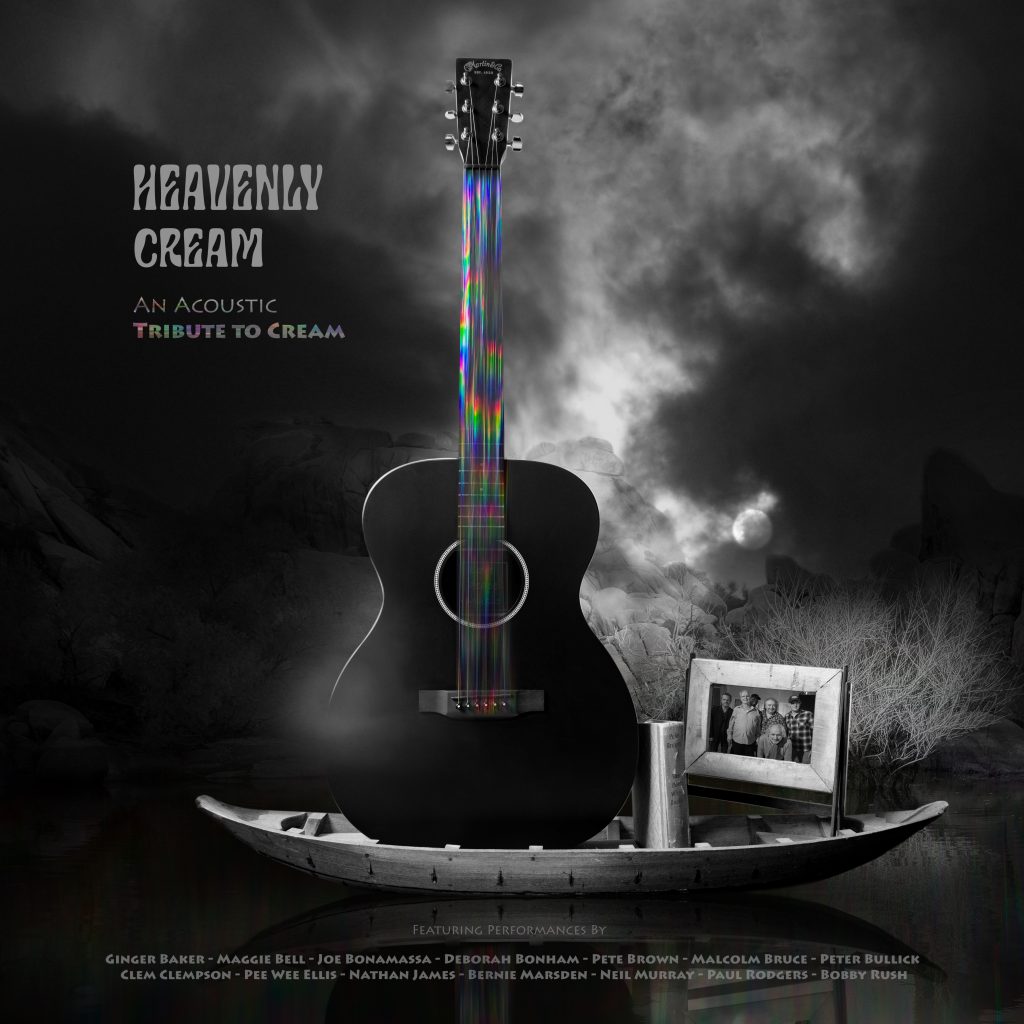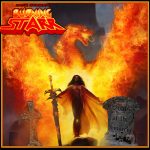Very few bands have the legendary status of Cream, and remember that they were only together for such a short time, 1966–1968. The group consisted of bassist Jack Bruce, guitarist Eric Clapton, and drummer Ginger Baker. Bruce was the primary songwriter and vocalist, although Clapton and Baker contributed songs. The band made four albums during this really short time scale, and the legacy of their impact and influence remains strong today. As all three were previously successful, some suggest they were the first true supergroup.
There were disagreements between Bruce and Baker that led to their decision to break up in May of 1968, though the band were persuaded to make a final album, Goodbye, and to tour, culminating in two final farewell concerts at the Royal Albert Hall on November 25 and 26, 1968, which were filmed and shown in cinemas.
Quarto Valley Records proudly announces the new album “Heavenly Cream: An Acoustic Tribute to Cream,” released on November 3. The album takes us on a magical journey, traveling the brief course of the iconic band’s musical life back to the raw, stripped-down magic of the creativity of Jack Bruce, Ginger Baker, Eric Clapton, and Pete Brown. Passionately produced and mixed by Rob Cass, the new album will be released via Quarto Valley Records on November 3rd on vinyl, CD, and digitally on all platforms.
The project honors CREAM’s legacy with a 15-track tribute album and features Pete Brown and Ginger Baker plus an impressive roster of renowned musicians who knew or were inspired by the iconic supergroup, including Joe Bonamassa, Deborah Bonham, Malcolm Bruce, Peter Bullick, Nathan James, Bernie Marsden, Maggie Bell, Rob Cass, Clem Clempson, Paul Rodgers, and Bobby Rush.
There were also invaluable musical contributions from Cheryl Alleyne, Winston Blissett, Moreno Buttinar, Abass Dodoo, John Donaldson, Pee Wee Ellis, Mo Foster, Neil Murray, Mo Nazam, Tony Remy, and Frank Tontoh.
While recording this tribute album, Pete Brown shared, “It took me a long time before I would attempt those songs. I grew up in Jack’s shadow, like Malcolm did as well, you know. I’m not trying to be Jack. No one will ever be Jack.” He added, “Eventually I felt, well, they’re my songs as well, and eventually, I grew into those songs that Jack and I wrote.”
The first single off the album, “Sunshine of Your Love,” was released on September 1 and features Ginger Baker on drums, Joe Bonamassa on vocals and guitar, Malcom Bruce on piano, and the late Bernie Marsden on vocals and guitar, with Neil Murray on bass and Abass Dodoo on percussion.
This iconic song, co-written by Jack Bruce and Pete Brown, was included on Cream’s best-selling second album, Disraeli Gears, in November 1967 and became one of Cream’s fan favorites.
With elements of hard rock and psychedelia, Cream bassist Bruce developed a distinctive riff for the tune,which became his signature bass riff. An edited version of the song was released in the U.S. that December and became the band’s first and highest-charting American single. It entered Billboard’s “Hot 100” chart in January 1968, reaching number 36. To this day, the song remains one of the band’s most endearing tunes. It was later named one of Rolling Stone’s 500 “Greatest Songs of All Time,” ranking number 65. The endurance of “Sunshine of Your Love” makes it a fitting first taste of the new album and the magic of Cream and their music. Now available to stream on all platforms.
“Heavenly Cream: An Acoustic Tribute to Cream” was recorded at Sensible Music and the legendary Abbey Road Studios in London. Years in the making, Quarto Valley Records’ executive Mike Carden initially approached Pete Brown, his long-time colleague and friend, in 2017 about a different project, and out of that meeting came the concept of doing a recording—a retrospective of CREAM music—which both Pete and Mike mutually agreed to. Pete had remained friends with Ginger Baker over the years and brought him on board. Following suit came Malcom Bruce (Jack’s son), and the gathering of the incredible talent on the album began to fall into place.

Malcolm Bruce, picture by Pattie Boyd
This interview is with Malcolm Bruce, Jack’s son, who, as a musician of note (he’s currently working on an opera involving a jester/soothsayer, among other characters, which sounds really exciting), was involved in the making of the album. We began with an old quote of Freddie Mercury’s, who once said, “You can do anything you like with my music once I’m dead, but never make it boring.” We wondered how Malcolm felt the music of Cream was reimagined for this project (and we are lucky enough to have heard the album; it is really great).
Malcolm- I see music as a tradition, and so part of that is who is doing the music again and why they are doing it. This project, “Heavenly Cream,” was instigated by our friend Pete Brown, who just passed away. Pete was the lyricist for Cream (and a performance beat poet), so he was at the heart of the creative process for the original band; it was his for the taking. It wasn’t some outsider taking the body of work and deciding to rework it. It was somebody who connected intimately with it. I suppose too I have that connection, of course, in the sense that it’s my father’s music and I grew up around my father, collaborated with him, and learned from him. I do play his music, even though I am a composer in my own right, and that is what I want to be doing. We share the traditions, and with that perspective as a starting point, we asked Ginger Baker to be involved, and everyone else involved is part of that larger tapestry of the same music tradition. Even somebody like Paul Rodgers grew up aware of Cream and was then inspired by them to enter the business. There is a shared heritage of listening to black American music as it emerged and the influence it had; it was all re-invented by bands like The Beatles and sold back to the US. We said with this project, ‘Let’s not do a rock record; let’s do an acoustic version of the songs,’ and from that fundamental premise, it was going to be something new for the sound. I toured for a number of years playing bass with Ginger Baker’s son Kofi on Music of Cream (a tribute band that also included Will Johns, Eric Clapton’s nephew, replicating his uncle’s guitar parts), and it’s such a great body of work and so rich for improvisation. That is what makes Cream so strong, but we hope we captured some of that on record. Even when Cream covered music like “Spoonful” by Willie Dixon (a blues number recorded in 1960 by Howlin Wolf), that could be stretched out as a riff to thirty minutes as it became a classical music form. You can play with the germ of an idea, expand it and contract it as you choose. To me, there is so much potential in the music, and it’s organic. I think, too, that the collection of musicians on the album fully understand blues music because their careers were built around it. Someone like Bobby Rush would come in, and his energy would lead the sessions. Bernie Marsden is another one. I first met Bernie Marsden when he came in and played on my dad’s last album, “Silver Rails” (2014). Bernie was always like a little kid; he loved playing the guitar in a simple, direct and passionate way, and that is the understanding of this music in history.
Cream also has jazz routes, of course, that often get forgotten when we read about Cream. We asked whether Malcolm felt the jazz elements were retained for this piece and whether the jazz aspect is relevant for appreciating the music of the band.
Malcolm- I’m not sure that it comes through on this record as such, but there are elements in the song Ginger wrote with my mom, “Sweet Wine.” There is a jazz section there that expands, but my father and Ginger certainly were influenced by jazz; that is important to note. My dad is famously quoted as saying, “We were a jazz band, but we just didn’t tell Eric.” In that sense, Eric is a blues purist, and if you talk with Eric, he would probably say he was no fan of jazz, and that’s fine because he had a vision of what he saw, and that is a powerful tradition too. My dad was classically trained and had a huge awareness of all kinds of music, which influenced me in turn. My dad understood jazz, but also the western classical tradition, and so, from a compositional standpoint, you hear those influences from my dad’s writing in particular. But you hear the expansive improvisational elements in the blues too; jazz and the blues share that, albeit in a simpler harmonic context. So that makes Cream unique, and looking only at my dad, that is what made him unique in the pantheon of rock music—he had these other influences bubbling under the surface. It made his compositions and developments unique. Instead of a pop song following those blocks, compositionally, it becomes more interesting when those blocks are reordered and harmonized.Within the popular music tradition, you need to do that in a way that doesn’t alienate the general listener, who would not understand it and find it too confusing. It can be done in the simplest ways, and the great blues musicians acknowledged that too. We are at a point in music history where everybody thinks the blues is this twelve-bar thing with a certain harmony, but go back to the earlier blues artists, and they didn’t think like that. They would play with five bars suddenly because there was a feeling and shape, not blocks. Music was more about feeling.

https://rockthejointmagazine.com/merchandise/
The blues men were great entertainers. Just read our feature with BB King’s daughter, Shirley King. She noted how great an entertainer her dad was and how it was all about the entertainment business.
Malcolm- Yes, there is that side. It’s multi-layered, but ultimately it is about entertaining people. But you also need to offer new ways of seeing and feeling. A great entertainer will give somebody something that is out of the norm. It may be an abstract feeling that made them dance and feel good, or maybe it is more profound. Great art can expand us in the way music can or a walk, or just the joyful transaction of kindness. That’s entertainment; elation can give hope. But conformity is the other side of the business, and we have to be careful about that. In the music business now, technology may be threatening the beautiful ability of humans to touch each other. I hope this record is an opportunity; it’s a stripped-down piece, and that is what the blues always are. But BB King, with his suit and girls, certainly entertained. Music, entertainment and the connection to the self—we all share those levels. Perhaps with more music, we would be less inclined to bomb each other. We are all one, all humans; we need humanity to wake up to that and spread some love and acceptance instead. In life, I think we give what we want to receive, and at some point we need to stop the hate and start to spread love and acceptance instead.
We are all horrified by the events on the news currently. We sent a note to each other at the magazine recently, a quote that said, “Countries are in trouble because they listen to their politicians far more than they listen to their poets.” We enjoyed the Ace Frehley version of two Cream classics, “White Room” (on Origins 1) and “Politician” (on Origins 2) With a focus on the song “Politician,” it is such a biting track lyrically and so relevant. We wondered how “Politician” was approached in today’s difficult climate for this album.
Malcolm- I agree that it is incredibly powerful lyrically and always has been. Pete Brown—that was his gift. I had the good fortune to write about twenty-five songs with him myself, so I have some insight into his work. He had a very pragmatic and practical approach. He could reel off a lyric if you gave him a title or idea; he would just come up with something and get inside your head. He had this intuitive side, like the great lyricists. This is the ability to get to the level of what people are feeling. What is politics anyway? It is a blight; why do we need them? They are self-serving; unfortunately, it is meant to be “by the people, for the people.”
How true! We hear how everything will change next year. And we will have a new government, but those old enough to know all know the names change, but the policies and outcomes all stay the same. Maybe cynical, but...
Malcolm- It is what it is. It’s like a slightly different species of human who has forgotten compassion. Remember, diplomacy does not mean you lie and rationalize it. You can’t rationalize killing women and children on any side. Find some diplomacy, meaning compassion. Once we are conscious, we will not step over a line where we should not go. Politics is a place where that’s all it’s about. It’s about serving the elite, and, call it what you want with a label, it’s the same club with the same group of people. It’s too easy to be desensitized if you are not connected to something higher, whatever you want to call it. If consciousness is not aware of itself, that’s where violence, greed and manipulation arise. And that song, “Politician,” in simple terms, is so insightful that it sums it up in a few lines. We all love that song, but it goes back deeper. “Sitting On Top Of The World” with Bobby Rush, 1926 I think that was written, and that is the blues speaking to the human condition and transcending it. We express it, call it out and name it. It’s also about hope in my heart.
We wondered about the running order of the album (“I Feel Free” to kick it off), and as vinyl listeners, we do appreciate the effort that goes into the concept of the whole piece. Does Malcolm feel we are losing something when the new generation just downloads the single?
Malcolm- We do seem to be losing something, and many contemporary artists would say we are not releasing albums any more and are just releasing singles. But it’s a conceptual thing. My album that I’m working on now is called “Fake Humans and RealDolls,s” and it’s a conceptual thing. Each track is in sequence, and conceptually, it is exploring ideas across a span of music, as a symphony or choral piece could. You can do that with Cream’s music; they have a great body of work,. We selected those that we felt were the most important ones to have, and then we assigned them to the artists. We found a shape to it and a record can take you on a journey, and we shouldn’t lose that. And we all have less attentionnow. I do it myself: listen to something for twenty seconds and expect it to connect immediately.
Last question: what album did Malcolm last listen to from beginning to end, and did he like it?
Malcolm – I think the last album I listened to from my CD collection was “Kid A” by Radiohead. I recommend it, it’s an interesting record, and it explores abstract ideas they were into at the time. An interesting sonic palate!
By Lorraine Foley
and
Mark C. Chambers
ALBUM TRACK LISTING
1. I Feel Free (feat. Deborah Bonham, Bernie Marsden and Malcolm Bruce) (3:17)
2. White Room (feat. Pete Brown, Malcolm Bruce and Clem Clempson) (5:46)
3. Theme for An Imaginary Western (feat. Pete Brown, Malcolm Bruce and Clem Clempson) (3:38)
4. We’re Going Wrong (feat. Malcolm Bruce and Clem Clempson) (3:32)
5. Sunshine of Your Love (feat. Ginger Baker, Joe Bonamassa, Malcolm Bruce and Bernie Marsden) (4:49)
6. Deserted Cities of The Heart (feat. Joe Bonamassa, Bernie Marsden and Malcolm Bruce) (3:51)
7. Sweet Wine (feat. Ginger Baker, Nathan James, Pee Wee Ellis, Bernie Marsden and Malcolm Bruce) (3:08)
8. Tales of Brave Ulysses (feat. Ginger Baker, Nathan James, Pee Wee Ellis Bernie Marsden and Malcolm Bruce) (3:18)
9. Crossroads (feat. Ginger Baker, Bernie Marsden, Joe Bonamassa and Malcolm Bruce) (2:53)
10. Take It Back (feat. Maggie Bell, Bernie Marsden and Malcolm Bruce) (3:22)
11. Spoonful (feat. Bobby Rush, Bernie Marsden and Malcolm Bruce) (4:39)
12. Sitting On Top Of The World (Feat. Bobby Rush, Maggie Bell, Bernie Marsden and Malcolm Bruce) (4:55)
13. Badge (feat. Deborah Bonham, Bernie Marsden and Malcolm Bruce) (3:36)
14. Politician (feat. Pete Brown, Bernie Marsden and Malcolm Bruce) (5:16)
15. Born Under a Bad Sign (feat. Paul Rodgers, Bernie Marsden and Malcolm Bruce) (3:51)
ALBUM CREDITS
Produced and mixed by Rob Cass
Executive Producer Bruce S Quarto
Executive Producer Pete Brown
Associate Executive Producer Mark Waters
Supervising Producer Michael Carden
Project Coordinator Peter Conway
Recorded at Sensible Music and Abbey Road Studios, London
Studio Engineers: John Moon, Paul Pritchard, Jonny Firth, Joe Taylor, George Oulton, Pearse Macintyre
Hello, we hope you enjoyed the feature. While here, read some of our reviews, features and so much more! If you like what we do, feel free to buy us a coffee as a nod of appreciation (link below) ! We also have our own merchandise range. Good to say hello to you.




